Investigating TQM's Impact on Manufacturing Quality at Volvo
VerifiedAdded on 2023/01/12
|19
|7046
|36
Thesis and Dissertation
AI Summary
This dissertation investigates the impact of Total Quality Management (TQM) on manufacturing quality, focusing on a case study of Volvo. The introduction provides an overview of the research, organization, background, research aim, objectives, and questions, along with the rationale and research structure. The literature review explores the theoretical framework, drawing on published sources such as books, journals, and articles. The research methodology outlines the systematic approach, including procedures and techniques used to analyze and select suitable methods. The dissertation covers data analysis and interpretation, potentially using both qualitative and quantitative methods. The conclusion and recommendations summarize key findings and offer suggestions for future research and improvements. The study aims to determine the role of TQM in the manufacturing process, assess its importance in improving quality, and identify challenges faced by Volvo. The structure includes an introduction, literature review, research methodology, data analysis and interpretation, and a conclusion with recommendations.
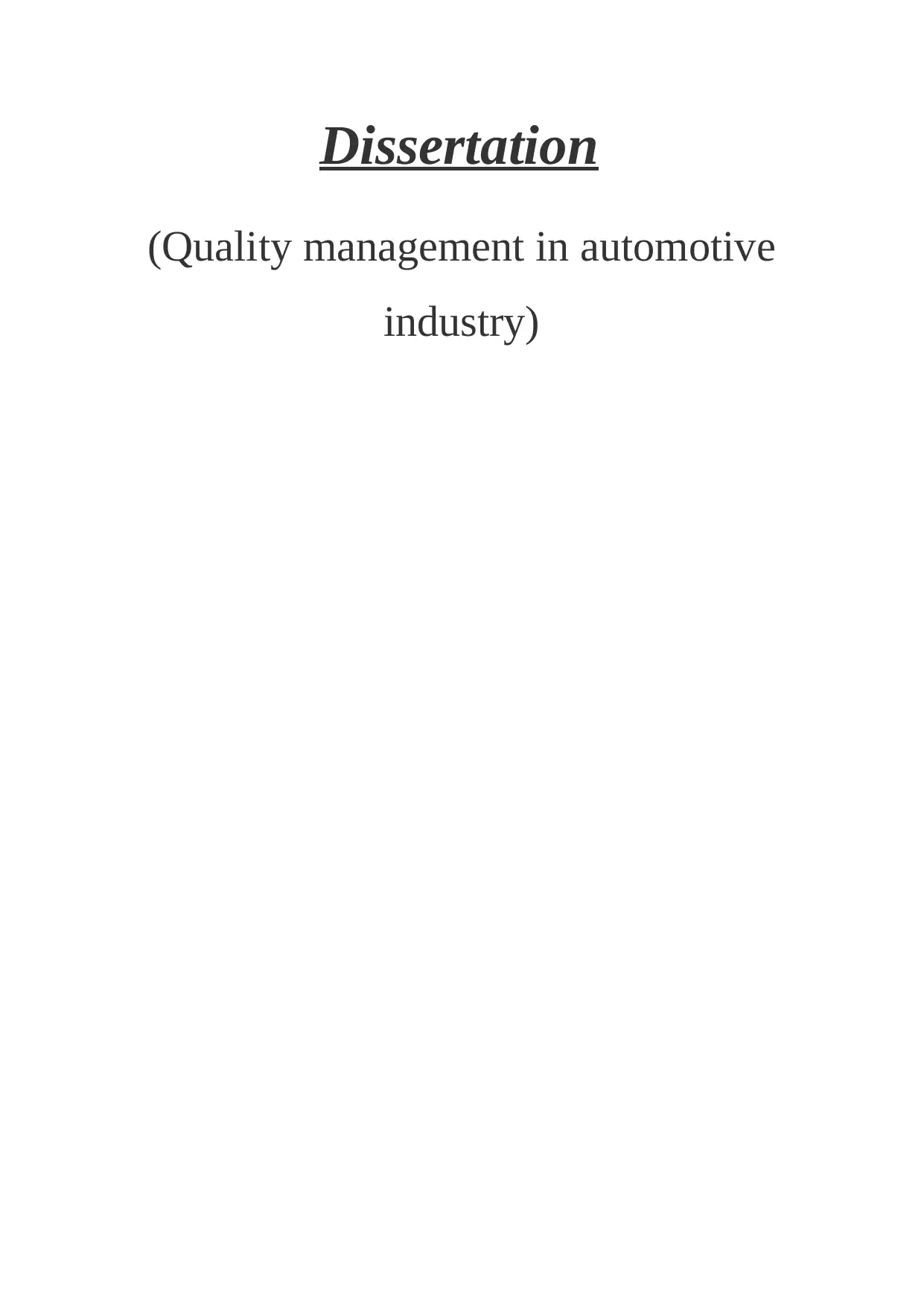
Dissertation
(Quality management in automotive
industry)
(Quality management in automotive
industry)
Paraphrase This Document
Need a fresh take? Get an instant paraphrase of this document with our AI Paraphraser
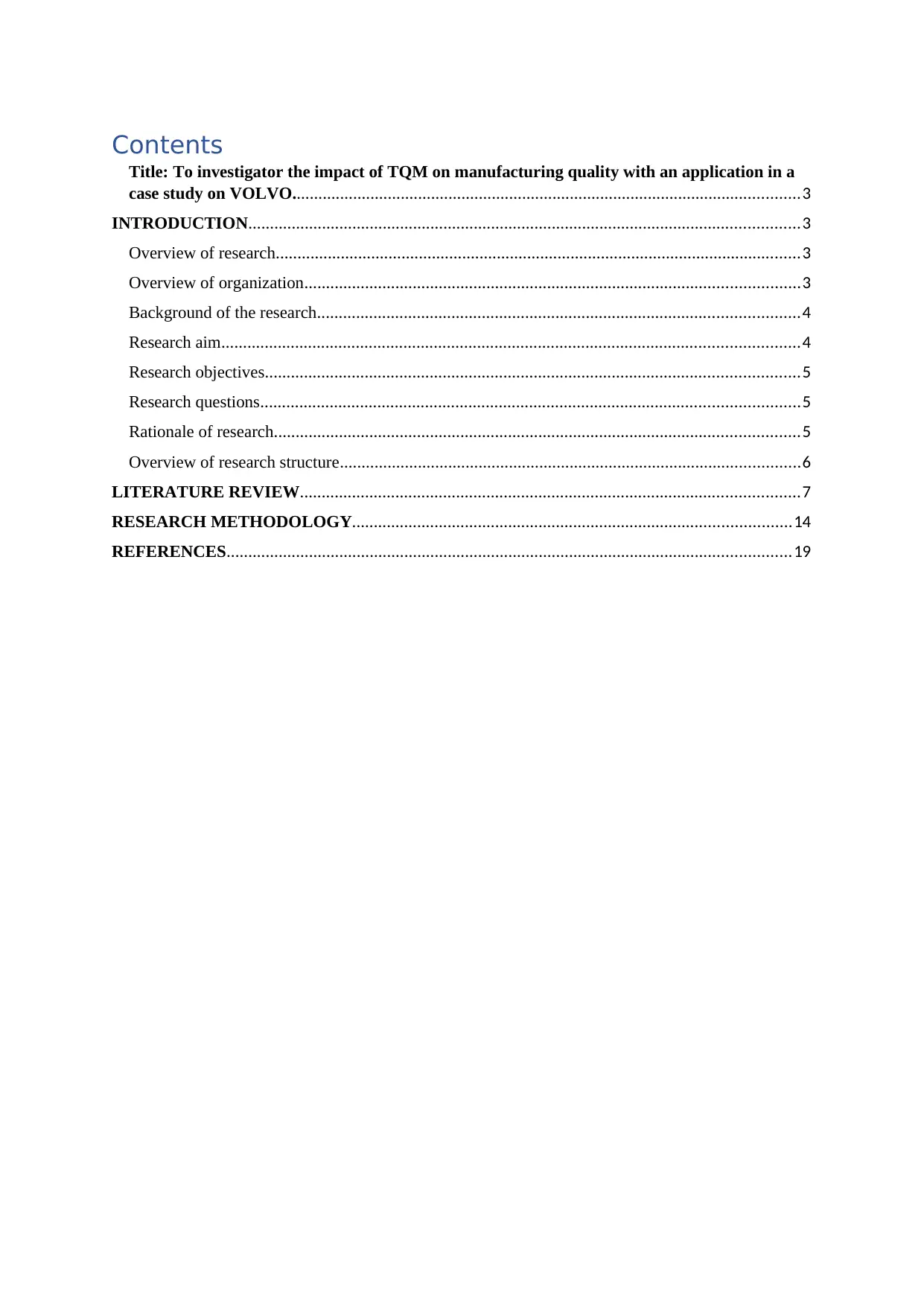
Contents
Title: To investigator the impact of TQM on manufacturing quality with an application in a
case study on VOLVO.....................................................................................................................3
INTRODUCTION...............................................................................................................................3
Overview of research.........................................................................................................................3
Overview of organization..................................................................................................................3
Background of the research...............................................................................................................4
Research aim.....................................................................................................................................4
Research objectives...........................................................................................................................5
Research questions............................................................................................................................5
Rationale of research.........................................................................................................................5
Overview of research structure..........................................................................................................6
LITERATURE REVIEW...................................................................................................................7
RESEARCH METHODOLOGY.....................................................................................................14
REFERENCES..................................................................................................................................19
Title: To investigator the impact of TQM on manufacturing quality with an application in a
case study on VOLVO.....................................................................................................................3
INTRODUCTION...............................................................................................................................3
Overview of research.........................................................................................................................3
Overview of organization..................................................................................................................3
Background of the research...............................................................................................................4
Research aim.....................................................................................................................................4
Research objectives...........................................................................................................................5
Research questions............................................................................................................................5
Rationale of research.........................................................................................................................5
Overview of research structure..........................................................................................................6
LITERATURE REVIEW...................................................................................................................7
RESEARCH METHODOLOGY.....................................................................................................14
REFERENCES..................................................................................................................................19
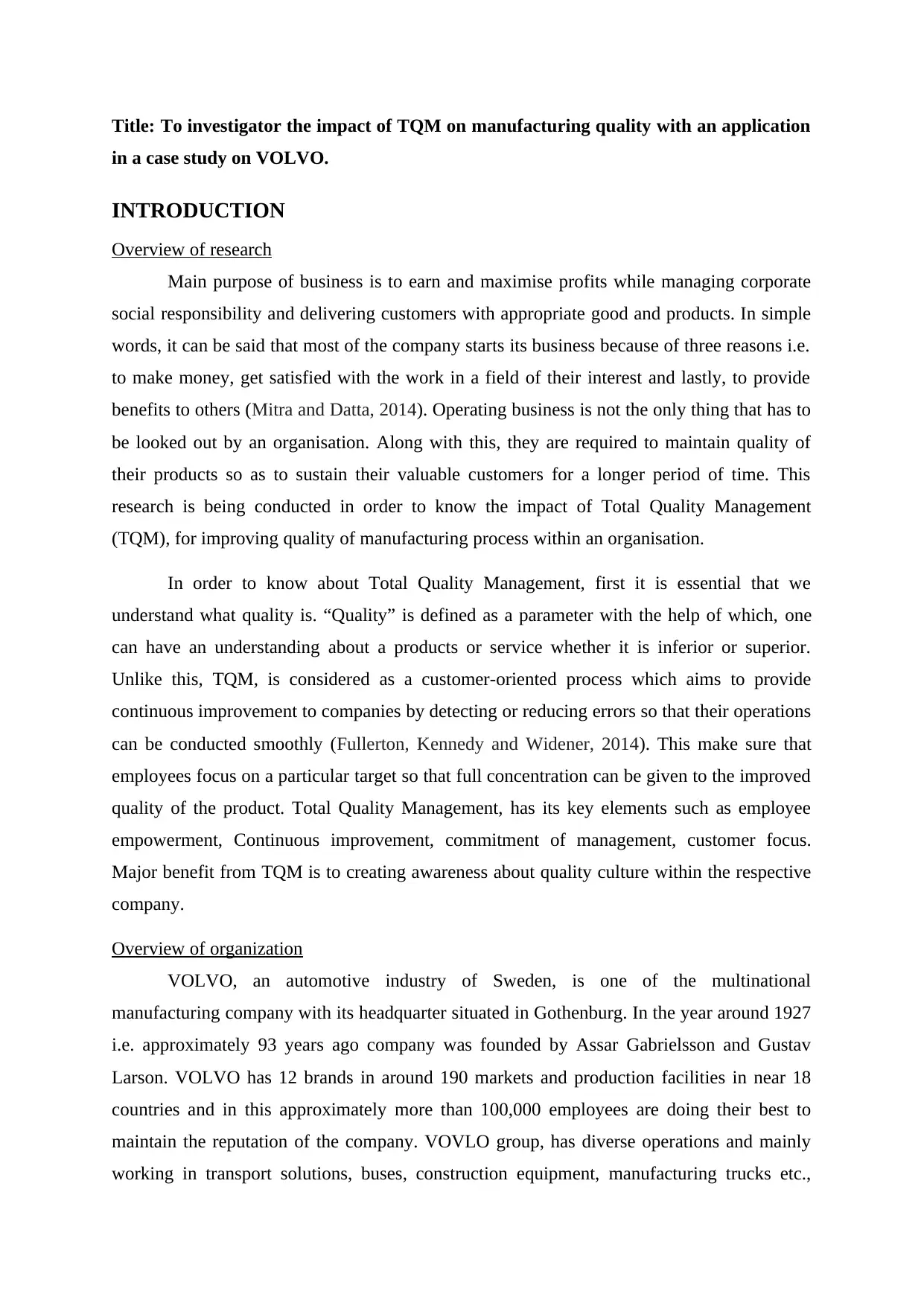
Title: To investigator the impact of TQM on manufacturing quality with an application
in a case study on VOLVO.
INTRODUCTION
Overview of research
Main purpose of business is to earn and maximise profits while managing corporate
social responsibility and delivering customers with appropriate good and products. In simple
words, it can be said that most of the company starts its business because of three reasons i.e.
to make money, get satisfied with the work in a field of their interest and lastly, to provide
benefits to others (Mitra and Datta, 2014). Operating business is not the only thing that has to
be looked out by an organisation. Along with this, they are required to maintain quality of
their products so as to sustain their valuable customers for a longer period of time. This
research is being conducted in order to know the impact of Total Quality Management
(TQM), for improving quality of manufacturing process within an organisation.
In order to know about Total Quality Management, first it is essential that we
understand what quality is. “Quality” is defined as a parameter with the help of which, one
can have an understanding about a products or service whether it is inferior or superior.
Unlike this, TQM, is considered as a customer-oriented process which aims to provide
continuous improvement to companies by detecting or reducing errors so that their operations
can be conducted smoothly (Fullerton, Kennedy and Widener, 2014). This make sure that
employees focus on a particular target so that full concentration can be given to the improved
quality of the product. Total Quality Management, has its key elements such as employee
empowerment, Continuous improvement, commitment of management, customer focus.
Major benefit from TQM is to creating awareness about quality culture within the respective
company.
Overview of organization
VOLVO, an automotive industry of Sweden, is one of the multinational
manufacturing company with its headquarter situated in Gothenburg. In the year around 1927
i.e. approximately 93 years ago company was founded by Assar Gabrielsson and Gustav
Larson. VOLVO has 12 brands in around 190 markets and production facilities in near 18
countries and in this approximately more than 100,000 employees are doing their best to
maintain the reputation of the company. VOVLO group, has diverse operations and mainly
working in transport solutions, buses, construction equipment, manufacturing trucks etc.,
in a case study on VOLVO.
INTRODUCTION
Overview of research
Main purpose of business is to earn and maximise profits while managing corporate
social responsibility and delivering customers with appropriate good and products. In simple
words, it can be said that most of the company starts its business because of three reasons i.e.
to make money, get satisfied with the work in a field of their interest and lastly, to provide
benefits to others (Mitra and Datta, 2014). Operating business is not the only thing that has to
be looked out by an organisation. Along with this, they are required to maintain quality of
their products so as to sustain their valuable customers for a longer period of time. This
research is being conducted in order to know the impact of Total Quality Management
(TQM), for improving quality of manufacturing process within an organisation.
In order to know about Total Quality Management, first it is essential that we
understand what quality is. “Quality” is defined as a parameter with the help of which, one
can have an understanding about a products or service whether it is inferior or superior.
Unlike this, TQM, is considered as a customer-oriented process which aims to provide
continuous improvement to companies by detecting or reducing errors so that their operations
can be conducted smoothly (Fullerton, Kennedy and Widener, 2014). This make sure that
employees focus on a particular target so that full concentration can be given to the improved
quality of the product. Total Quality Management, has its key elements such as employee
empowerment, Continuous improvement, commitment of management, customer focus.
Major benefit from TQM is to creating awareness about quality culture within the respective
company.
Overview of organization
VOLVO, an automotive industry of Sweden, is one of the multinational
manufacturing company with its headquarter situated in Gothenburg. In the year around 1927
i.e. approximately 93 years ago company was founded by Assar Gabrielsson and Gustav
Larson. VOLVO has 12 brands in around 190 markets and production facilities in near 18
countries and in this approximately more than 100,000 employees are doing their best to
maintain the reputation of the company. VOVLO group, has diverse operations and mainly
working in transport solutions, buses, construction equipment, manufacturing trucks etc.,
⊘ This is a preview!⊘
Do you want full access?
Subscribe today to unlock all pages.

Trusted by 1+ million students worldwide
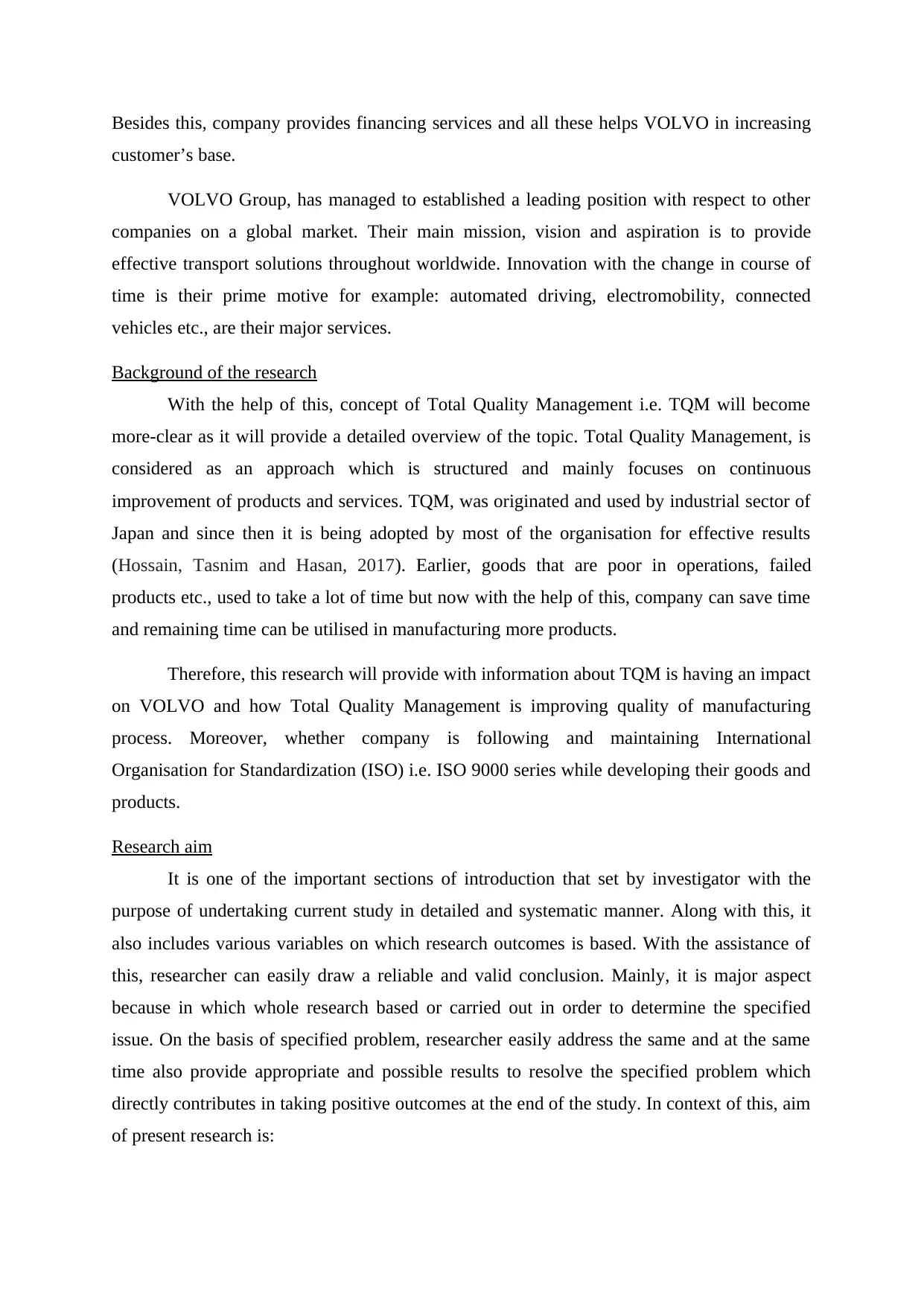
Besides this, company provides financing services and all these helps VOLVO in increasing
customer’s base.
VOLVO Group, has managed to established a leading position with respect to other
companies on a global market. Their main mission, vision and aspiration is to provide
effective transport solutions throughout worldwide. Innovation with the change in course of
time is their prime motive for example: automated driving, electromobility, connected
vehicles etc., are their major services.
Background of the research
With the help of this, concept of Total Quality Management i.e. TQM will become
more-clear as it will provide a detailed overview of the topic. Total Quality Management, is
considered as an approach which is structured and mainly focuses on continuous
improvement of products and services. TQM, was originated and used by industrial sector of
Japan and since then it is being adopted by most of the organisation for effective results
(Hossain, Tasnim and Hasan, 2017). Earlier, goods that are poor in operations, failed
products etc., used to take a lot of time but now with the help of this, company can save time
and remaining time can be utilised in manufacturing more products.
Therefore, this research will provide with information about TQM is having an impact
on VOLVO and how Total Quality Management is improving quality of manufacturing
process. Moreover, whether company is following and maintaining International
Organisation for Standardization (ISO) i.e. ISO 9000 series while developing their goods and
products.
Research aim
It is one of the important sections of introduction that set by investigator with the
purpose of undertaking current study in detailed and systematic manner. Along with this, it
also includes various variables on which research outcomes is based. With the assistance of
this, researcher can easily draw a reliable and valid conclusion. Mainly, it is major aspect
because in which whole research based or carried out in order to determine the specified
issue. On the basis of specified problem, researcher easily address the same and at the same
time also provide appropriate and possible results to resolve the specified problem which
directly contributes in taking positive outcomes at the end of the study. In context of this, aim
of present research is:
customer’s base.
VOLVO Group, has managed to established a leading position with respect to other
companies on a global market. Their main mission, vision and aspiration is to provide
effective transport solutions throughout worldwide. Innovation with the change in course of
time is their prime motive for example: automated driving, electromobility, connected
vehicles etc., are their major services.
Background of the research
With the help of this, concept of Total Quality Management i.e. TQM will become
more-clear as it will provide a detailed overview of the topic. Total Quality Management, is
considered as an approach which is structured and mainly focuses on continuous
improvement of products and services. TQM, was originated and used by industrial sector of
Japan and since then it is being adopted by most of the organisation for effective results
(Hossain, Tasnim and Hasan, 2017). Earlier, goods that are poor in operations, failed
products etc., used to take a lot of time but now with the help of this, company can save time
and remaining time can be utilised in manufacturing more products.
Therefore, this research will provide with information about TQM is having an impact
on VOLVO and how Total Quality Management is improving quality of manufacturing
process. Moreover, whether company is following and maintaining International
Organisation for Standardization (ISO) i.e. ISO 9000 series while developing their goods and
products.
Research aim
It is one of the important sections of introduction that set by investigator with the
purpose of undertaking current study in detailed and systematic manner. Along with this, it
also includes various variables on which research outcomes is based. With the assistance of
this, researcher can easily draw a reliable and valid conclusion. Mainly, it is major aspect
because in which whole research based or carried out in order to determine the specified
issue. On the basis of specified problem, researcher easily address the same and at the same
time also provide appropriate and possible results to resolve the specified problem which
directly contributes in taking positive outcomes at the end of the study. In context of this, aim
of present research is:
Paraphrase This Document
Need a fresh take? Get an instant paraphrase of this document with our AI Paraphraser
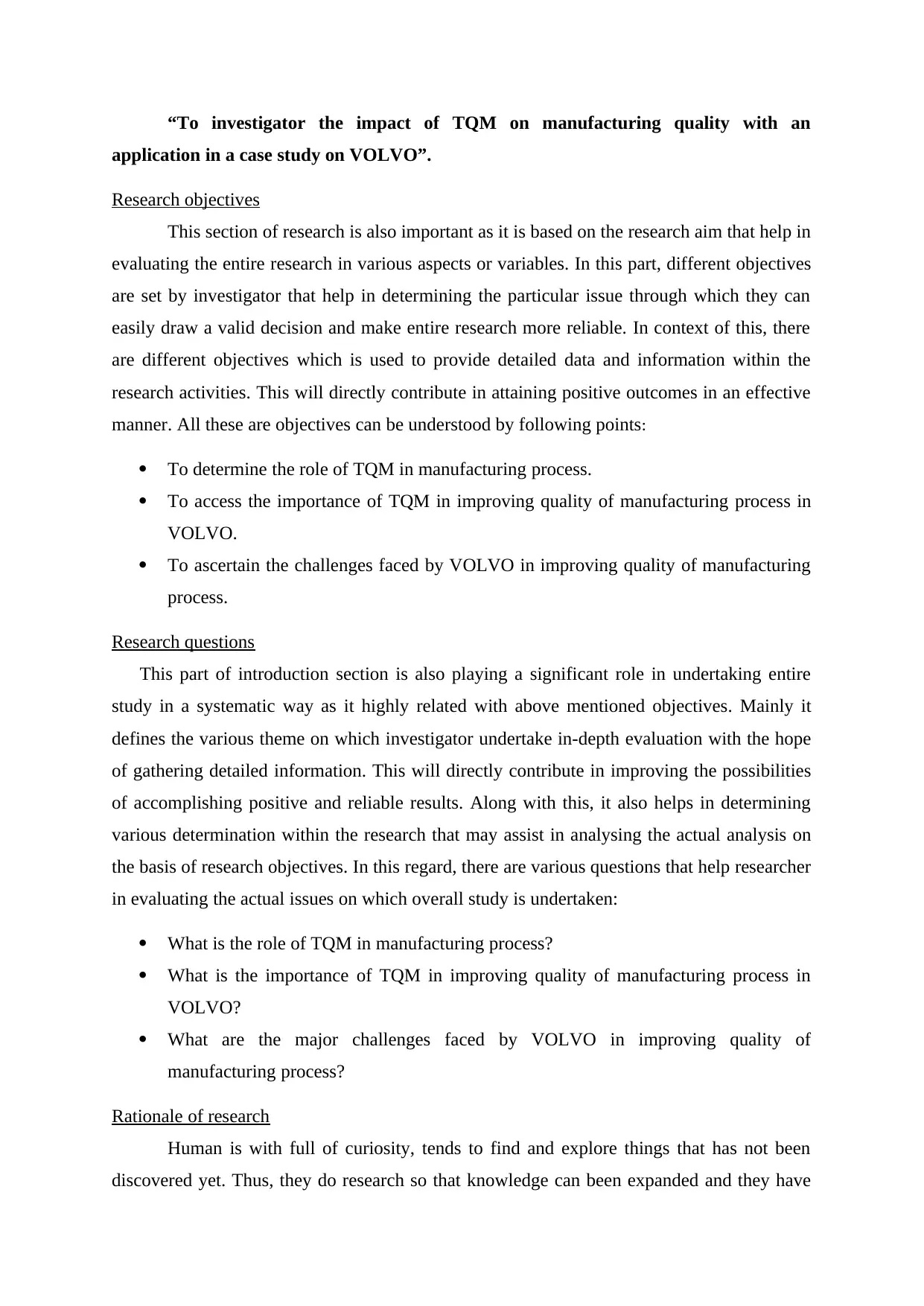
“To investigator the impact of TQM on manufacturing quality with an
application in a case study on VOLVO”.
Research objectives
This section of research is also important as it is based on the research aim that help in
evaluating the entire research in various aspects or variables. In this part, different objectives
are set by investigator that help in determining the particular issue through which they can
easily draw a valid decision and make entire research more reliable. In context of this, there
are different objectives which is used to provide detailed data and information within the
research activities. This will directly contribute in attaining positive outcomes in an effective
manner. All these are objectives can be understood by following points:
To determine the role of TQM in manufacturing process.
To access the importance of TQM in improving quality of manufacturing process in
VOLVO.
To ascertain the challenges faced by VOLVO in improving quality of manufacturing
process.
Research questions
This part of introduction section is also playing a significant role in undertaking entire
study in a systematic way as it highly related with above mentioned objectives. Mainly it
defines the various theme on which investigator undertake in-depth evaluation with the hope
of gathering detailed information. This will directly contribute in improving the possibilities
of accomplishing positive and reliable results. Along with this, it also helps in determining
various determination within the research that may assist in analysing the actual analysis on
the basis of research objectives. In this regard, there are various questions that help researcher
in evaluating the actual issues on which overall study is undertaken:
What is the role of TQM in manufacturing process?
What is the importance of TQM in improving quality of manufacturing process in
VOLVO?
What are the major challenges faced by VOLVO in improving quality of
manufacturing process?
Rationale of research
Human is with full of curiosity, tends to find and explore things that has not been
discovered yet. Thus, they do research so that knowledge can been expanded and they have
application in a case study on VOLVO”.
Research objectives
This section of research is also important as it is based on the research aim that help in
evaluating the entire research in various aspects or variables. In this part, different objectives
are set by investigator that help in determining the particular issue through which they can
easily draw a valid decision and make entire research more reliable. In context of this, there
are different objectives which is used to provide detailed data and information within the
research activities. This will directly contribute in attaining positive outcomes in an effective
manner. All these are objectives can be understood by following points:
To determine the role of TQM in manufacturing process.
To access the importance of TQM in improving quality of manufacturing process in
VOLVO.
To ascertain the challenges faced by VOLVO in improving quality of manufacturing
process.
Research questions
This part of introduction section is also playing a significant role in undertaking entire
study in a systematic way as it highly related with above mentioned objectives. Mainly it
defines the various theme on which investigator undertake in-depth evaluation with the hope
of gathering detailed information. This will directly contribute in improving the possibilities
of accomplishing positive and reliable results. Along with this, it also helps in determining
various determination within the research that may assist in analysing the actual analysis on
the basis of research objectives. In this regard, there are various questions that help researcher
in evaluating the actual issues on which overall study is undertaken:
What is the role of TQM in manufacturing process?
What is the importance of TQM in improving quality of manufacturing process in
VOLVO?
What are the major challenges faced by VOLVO in improving quality of
manufacturing process?
Rationale of research
Human is with full of curiosity, tends to find and explore things that has not been
discovered yet. Thus, they do research so that knowledge can been expanded and they have
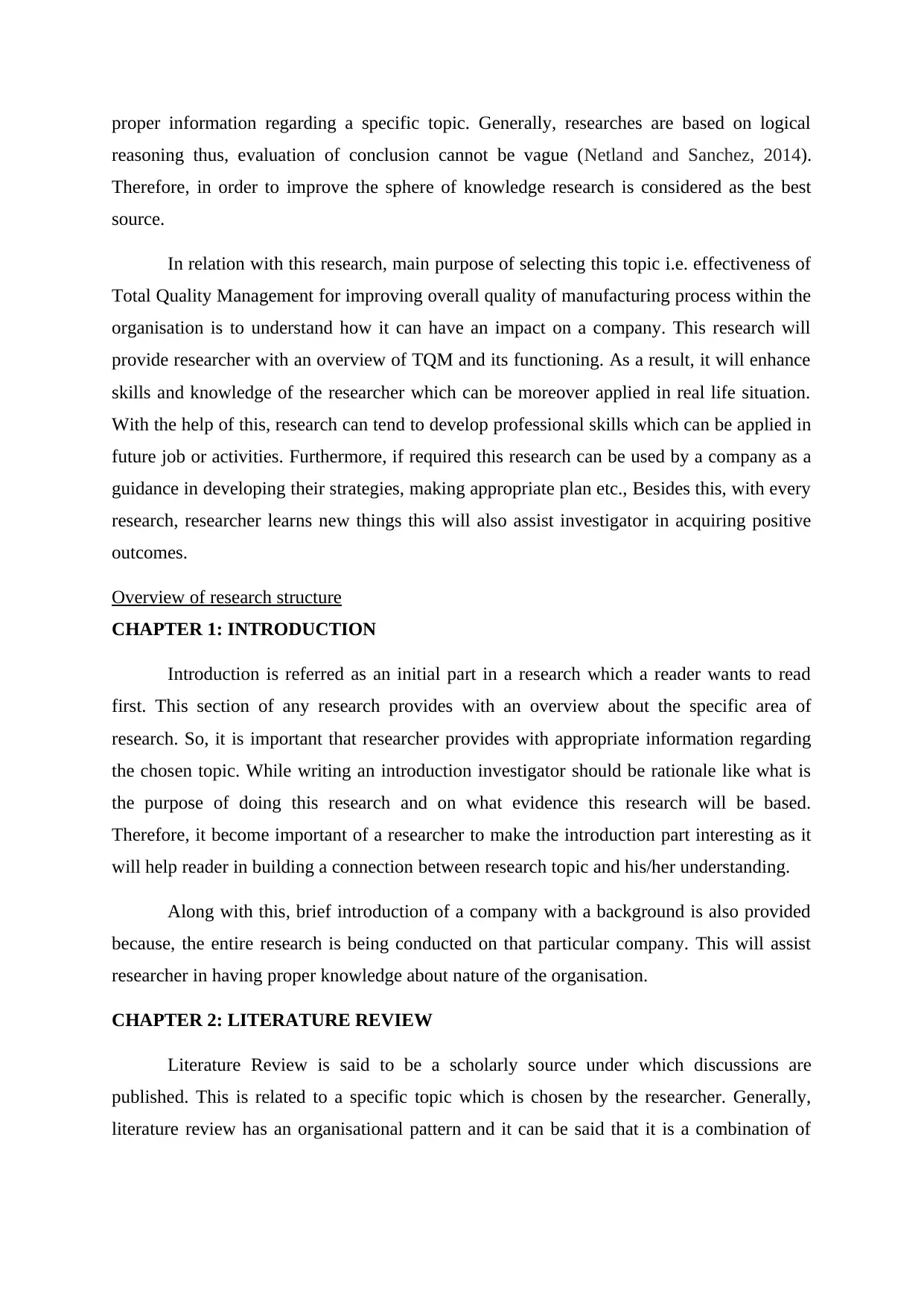
proper information regarding a specific topic. Generally, researches are based on logical
reasoning thus, evaluation of conclusion cannot be vague (Netland and Sanchez, 2014).
Therefore, in order to improve the sphere of knowledge research is considered as the best
source.
In relation with this research, main purpose of selecting this topic i.e. effectiveness of
Total Quality Management for improving overall quality of manufacturing process within the
organisation is to understand how it can have an impact on a company. This research will
provide researcher with an overview of TQM and its functioning. As a result, it will enhance
skills and knowledge of the researcher which can be moreover applied in real life situation.
With the help of this, research can tend to develop professional skills which can be applied in
future job or activities. Furthermore, if required this research can be used by a company as a
guidance in developing their strategies, making appropriate plan etc., Besides this, with every
research, researcher learns new things this will also assist investigator in acquiring positive
outcomes.
Overview of research structure
CHAPTER 1: INTRODUCTION
Introduction is referred as an initial part in a research which a reader wants to read
first. This section of any research provides with an overview about the specific area of
research. So, it is important that researcher provides with appropriate information regarding
the chosen topic. While writing an introduction investigator should be rationale like what is
the purpose of doing this research and on what evidence this research will be based.
Therefore, it become important of a researcher to make the introduction part interesting as it
will help reader in building a connection between research topic and his/her understanding.
Along with this, brief introduction of a company with a background is also provided
because, the entire research is being conducted on that particular company. This will assist
researcher in having proper knowledge about nature of the organisation.
CHAPTER 2: LITERATURE REVIEW
Literature Review is said to be a scholarly source under which discussions are
published. This is related to a specific topic which is chosen by the researcher. Generally,
literature review has an organisational pattern and it can be said that it is a combination of
reasoning thus, evaluation of conclusion cannot be vague (Netland and Sanchez, 2014).
Therefore, in order to improve the sphere of knowledge research is considered as the best
source.
In relation with this research, main purpose of selecting this topic i.e. effectiveness of
Total Quality Management for improving overall quality of manufacturing process within the
organisation is to understand how it can have an impact on a company. This research will
provide researcher with an overview of TQM and its functioning. As a result, it will enhance
skills and knowledge of the researcher which can be moreover applied in real life situation.
With the help of this, research can tend to develop professional skills which can be applied in
future job or activities. Furthermore, if required this research can be used by a company as a
guidance in developing their strategies, making appropriate plan etc., Besides this, with every
research, researcher learns new things this will also assist investigator in acquiring positive
outcomes.
Overview of research structure
CHAPTER 1: INTRODUCTION
Introduction is referred as an initial part in a research which a reader wants to read
first. This section of any research provides with an overview about the specific area of
research. So, it is important that researcher provides with appropriate information regarding
the chosen topic. While writing an introduction investigator should be rationale like what is
the purpose of doing this research and on what evidence this research will be based.
Therefore, it become important of a researcher to make the introduction part interesting as it
will help reader in building a connection between research topic and his/her understanding.
Along with this, brief introduction of a company with a background is also provided
because, the entire research is being conducted on that particular company. This will assist
researcher in having proper knowledge about nature of the organisation.
CHAPTER 2: LITERATURE REVIEW
Literature Review is said to be a scholarly source under which discussions are
published. This is related to a specific topic which is chosen by the researcher. Generally,
literature review has an organisational pattern and it can be said that it is a combination of
⊘ This is a preview!⊘
Do you want full access?
Subscribe today to unlock all pages.

Trusted by 1+ million students worldwide
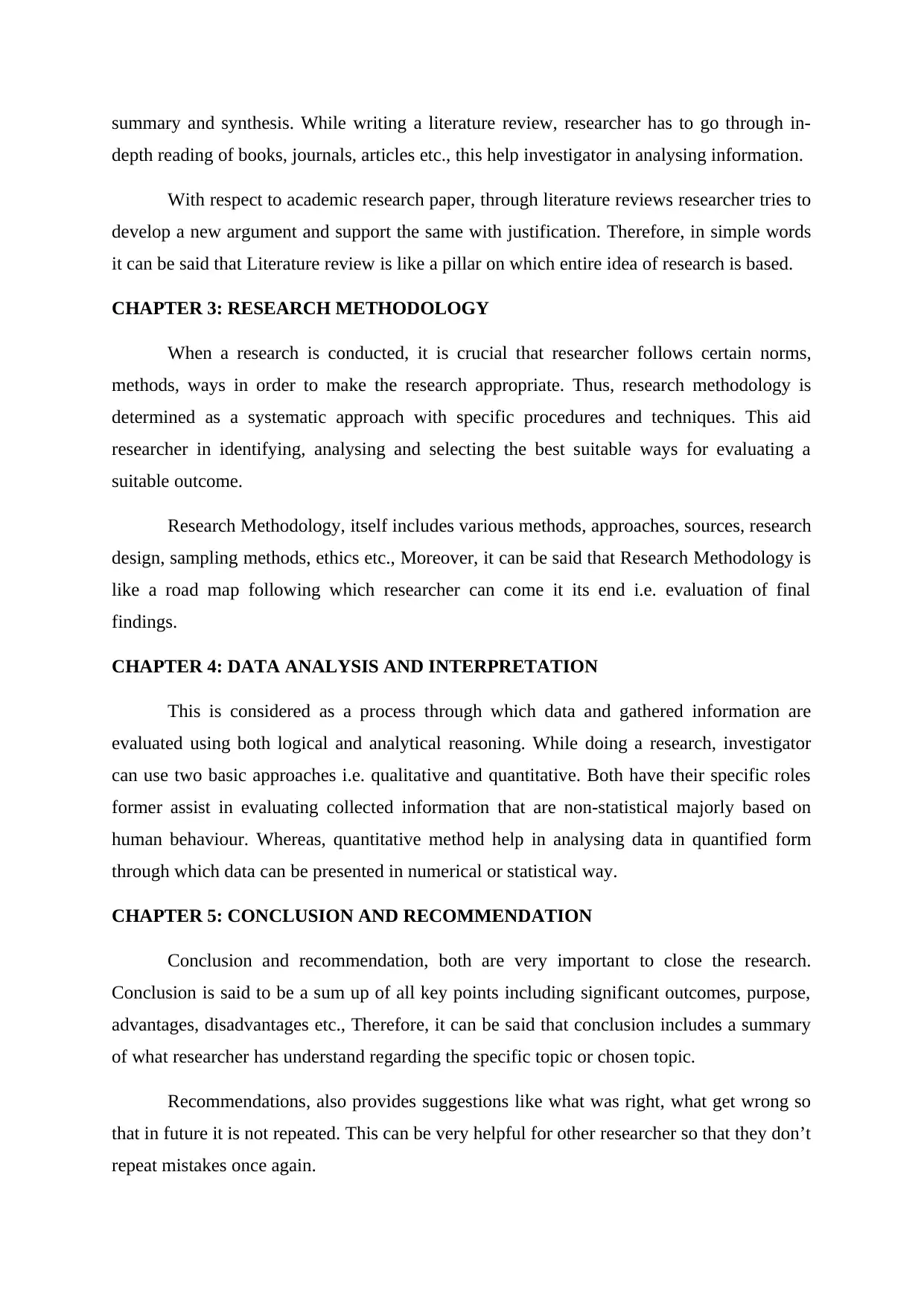
summary and synthesis. While writing a literature review, researcher has to go through in-
depth reading of books, journals, articles etc., this help investigator in analysing information.
With respect to academic research paper, through literature reviews researcher tries to
develop a new argument and support the same with justification. Therefore, in simple words
it can be said that Literature review is like a pillar on which entire idea of research is based.
CHAPTER 3: RESEARCH METHODOLOGY
When a research is conducted, it is crucial that researcher follows certain norms,
methods, ways in order to make the research appropriate. Thus, research methodology is
determined as a systematic approach with specific procedures and techniques. This aid
researcher in identifying, analysing and selecting the best suitable ways for evaluating a
suitable outcome.
Research Methodology, itself includes various methods, approaches, sources, research
design, sampling methods, ethics etc., Moreover, it can be said that Research Methodology is
like a road map following which researcher can come it its end i.e. evaluation of final
findings.
CHAPTER 4: DATA ANALYSIS AND INTERPRETATION
This is considered as a process through which data and gathered information are
evaluated using both logical and analytical reasoning. While doing a research, investigator
can use two basic approaches i.e. qualitative and quantitative. Both have their specific roles
former assist in evaluating collected information that are non-statistical majorly based on
human behaviour. Whereas, quantitative method help in analysing data in quantified form
through which data can be presented in numerical or statistical way.
CHAPTER 5: CONCLUSION AND RECOMMENDATION
Conclusion and recommendation, both are very important to close the research.
Conclusion is said to be a sum up of all key points including significant outcomes, purpose,
advantages, disadvantages etc., Therefore, it can be said that conclusion includes a summary
of what researcher has understand regarding the specific topic or chosen topic.
Recommendations, also provides suggestions like what was right, what get wrong so
that in future it is not repeated. This can be very helpful for other researcher so that they don’t
repeat mistakes once again.
depth reading of books, journals, articles etc., this help investigator in analysing information.
With respect to academic research paper, through literature reviews researcher tries to
develop a new argument and support the same with justification. Therefore, in simple words
it can be said that Literature review is like a pillar on which entire idea of research is based.
CHAPTER 3: RESEARCH METHODOLOGY
When a research is conducted, it is crucial that researcher follows certain norms,
methods, ways in order to make the research appropriate. Thus, research methodology is
determined as a systematic approach with specific procedures and techniques. This aid
researcher in identifying, analysing and selecting the best suitable ways for evaluating a
suitable outcome.
Research Methodology, itself includes various methods, approaches, sources, research
design, sampling methods, ethics etc., Moreover, it can be said that Research Methodology is
like a road map following which researcher can come it its end i.e. evaluation of final
findings.
CHAPTER 4: DATA ANALYSIS AND INTERPRETATION
This is considered as a process through which data and gathered information are
evaluated using both logical and analytical reasoning. While doing a research, investigator
can use two basic approaches i.e. qualitative and quantitative. Both have their specific roles
former assist in evaluating collected information that are non-statistical majorly based on
human behaviour. Whereas, quantitative method help in analysing data in quantified form
through which data can be presented in numerical or statistical way.
CHAPTER 5: CONCLUSION AND RECOMMENDATION
Conclusion and recommendation, both are very important to close the research.
Conclusion is said to be a sum up of all key points including significant outcomes, purpose,
advantages, disadvantages etc., Therefore, it can be said that conclusion includes a summary
of what researcher has understand regarding the specific topic or chosen topic.
Recommendations, also provides suggestions like what was right, what get wrong so
that in future it is not repeated. This can be very helpful for other researcher so that they don’t
repeat mistakes once again.
Paraphrase This Document
Need a fresh take? Get an instant paraphrase of this document with our AI Paraphraser
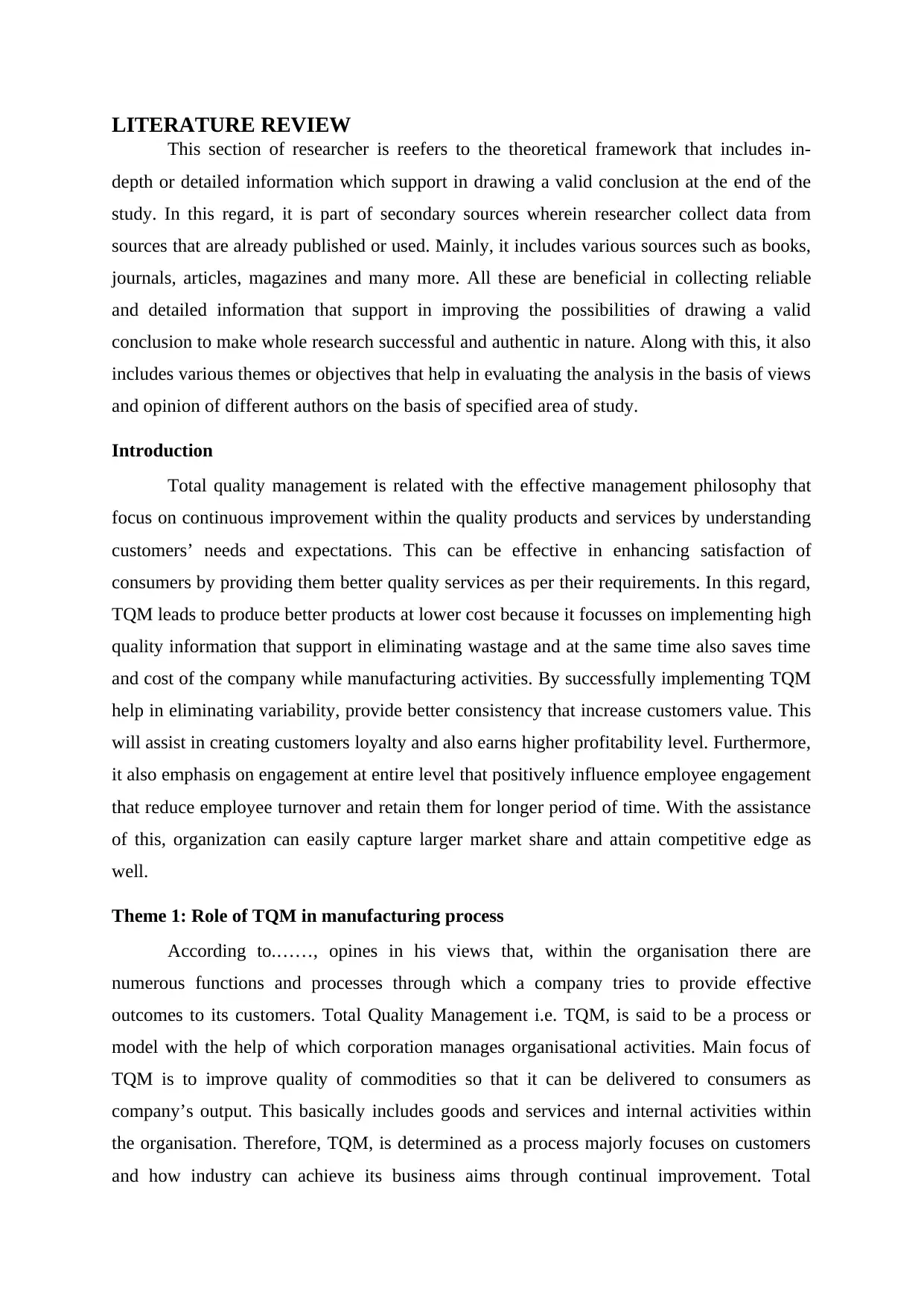
LITERATURE REVIEW
This section of researcher is reefers to the theoretical framework that includes in-
depth or detailed information which support in drawing a valid conclusion at the end of the
study. In this regard, it is part of secondary sources wherein researcher collect data from
sources that are already published or used. Mainly, it includes various sources such as books,
journals, articles, magazines and many more. All these are beneficial in collecting reliable
and detailed information that support in improving the possibilities of drawing a valid
conclusion to make whole research successful and authentic in nature. Along with this, it also
includes various themes or objectives that help in evaluating the analysis in the basis of views
and opinion of different authors on the basis of specified area of study.
Introduction
Total quality management is related with the effective management philosophy that
focus on continuous improvement within the quality products and services by understanding
customers’ needs and expectations. This can be effective in enhancing satisfaction of
consumers by providing them better quality services as per their requirements. In this regard,
TQM leads to produce better products at lower cost because it focusses on implementing high
quality information that support in eliminating wastage and at the same time also saves time
and cost of the company while manufacturing activities. By successfully implementing TQM
help in eliminating variability, provide better consistency that increase customers value. This
will assist in creating customers loyalty and also earns higher profitability level. Furthermore,
it also emphasis on engagement at entire level that positively influence employee engagement
that reduce employee turnover and retain them for longer period of time. With the assistance
of this, organization can easily capture larger market share and attain competitive edge as
well.
Theme 1: Role of TQM in manufacturing process
According to.……, opines in his views that, within the organisation there are
numerous functions and processes through which a company tries to provide effective
outcomes to its customers. Total Quality Management i.e. TQM, is said to be a process or
model with the help of which corporation manages organisational activities. Main focus of
TQM is to improve quality of commodities so that it can be delivered to consumers as
company’s output. This basically includes goods and services and internal activities within
the organisation. Therefore, TQM, is determined as a process majorly focuses on customers
and how industry can achieve its business aims through continual improvement. Total
This section of researcher is reefers to the theoretical framework that includes in-
depth or detailed information which support in drawing a valid conclusion at the end of the
study. In this regard, it is part of secondary sources wherein researcher collect data from
sources that are already published or used. Mainly, it includes various sources such as books,
journals, articles, magazines and many more. All these are beneficial in collecting reliable
and detailed information that support in improving the possibilities of drawing a valid
conclusion to make whole research successful and authentic in nature. Along with this, it also
includes various themes or objectives that help in evaluating the analysis in the basis of views
and opinion of different authors on the basis of specified area of study.
Introduction
Total quality management is related with the effective management philosophy that
focus on continuous improvement within the quality products and services by understanding
customers’ needs and expectations. This can be effective in enhancing satisfaction of
consumers by providing them better quality services as per their requirements. In this regard,
TQM leads to produce better products at lower cost because it focusses on implementing high
quality information that support in eliminating wastage and at the same time also saves time
and cost of the company while manufacturing activities. By successfully implementing TQM
help in eliminating variability, provide better consistency that increase customers value. This
will assist in creating customers loyalty and also earns higher profitability level. Furthermore,
it also emphasis on engagement at entire level that positively influence employee engagement
that reduce employee turnover and retain them for longer period of time. With the assistance
of this, organization can easily capture larger market share and attain competitive edge as
well.
Theme 1: Role of TQM in manufacturing process
According to.……, opines in his views that, within the organisation there are
numerous functions and processes through which a company tries to provide effective
outcomes to its customers. Total Quality Management i.e. TQM, is said to be a process or
model with the help of which corporation manages organisational activities. Main focus of
TQM is to improve quality of commodities so that it can be delivered to consumers as
company’s output. This basically includes goods and services and internal activities within
the organisation. Therefore, TQM, is determined as a process majorly focuses on customers
and how industry can achieve its business aims through continual improvement. Total
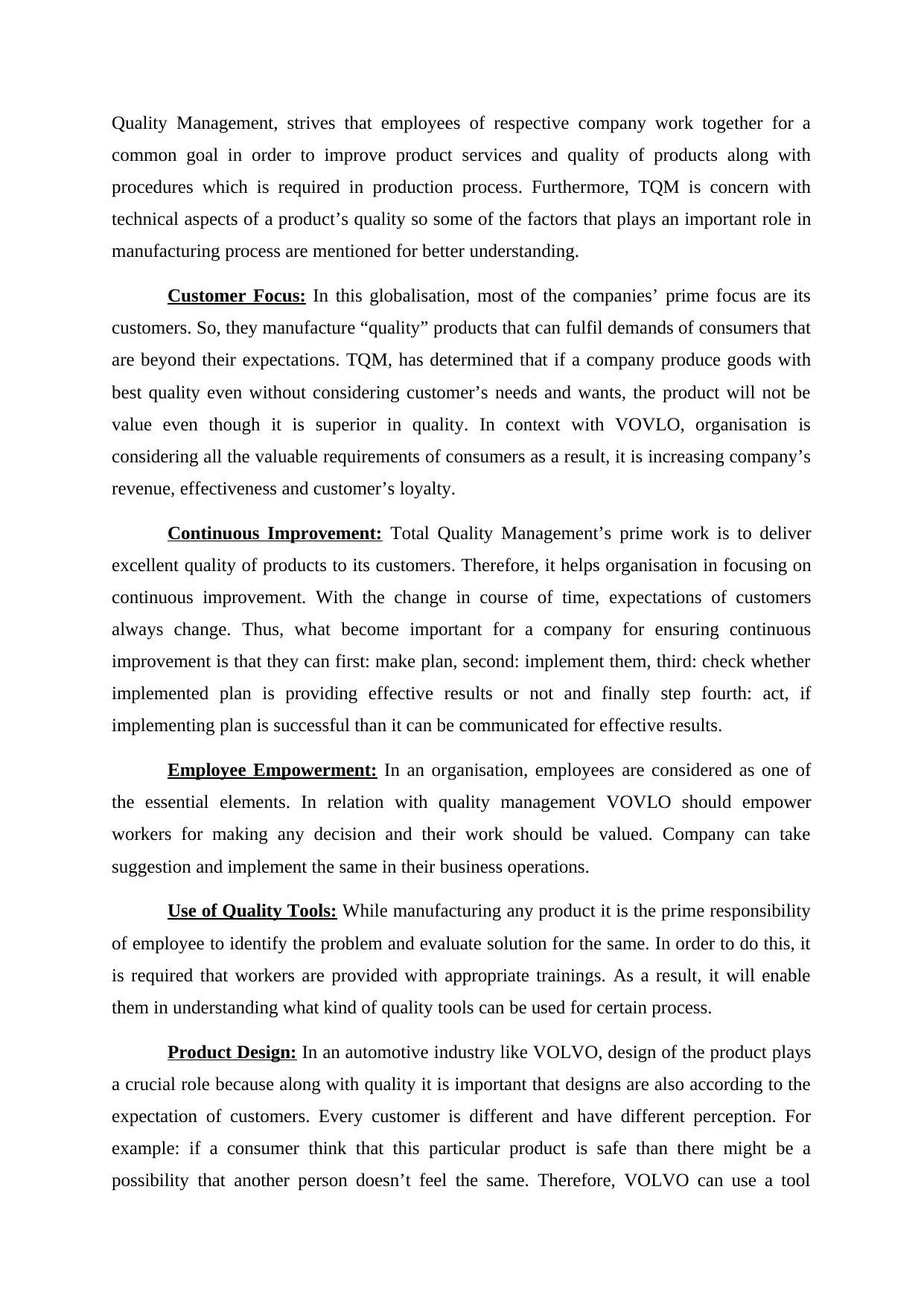
Quality Management, strives that employees of respective company work together for a
common goal in order to improve product services and quality of products along with
procedures which is required in production process. Furthermore, TQM is concern with
technical aspects of a product’s quality so some of the factors that plays an important role in
manufacturing process are mentioned for better understanding.
Customer Focus: In this globalisation, most of the companies’ prime focus are its
customers. So, they manufacture “quality” products that can fulfil demands of consumers that
are beyond their expectations. TQM, has determined that if a company produce goods with
best quality even without considering customer’s needs and wants, the product will not be
value even though it is superior in quality. In context with VOVLO, organisation is
considering all the valuable requirements of consumers as a result, it is increasing company’s
revenue, effectiveness and customer’s loyalty.
Continuous Improvement: Total Quality Management’s prime work is to deliver
excellent quality of products to its customers. Therefore, it helps organisation in focusing on
continuous improvement. With the change in course of time, expectations of customers
always change. Thus, what become important for a company for ensuring continuous
improvement is that they can first: make plan, second: implement them, third: check whether
implemented plan is providing effective results or not and finally step fourth: act, if
implementing plan is successful than it can be communicated for effective results.
Employee Empowerment: In an organisation, employees are considered as one of
the essential elements. In relation with quality management VOVLO should empower
workers for making any decision and their work should be valued. Company can take
suggestion and implement the same in their business operations.
Use of Quality Tools: While manufacturing any product it is the prime responsibility
of employee to identify the problem and evaluate solution for the same. In order to do this, it
is required that workers are provided with appropriate trainings. As a result, it will enable
them in understanding what kind of quality tools can be used for certain process.
Product Design: In an automotive industry like VOLVO, design of the product plays
a crucial role because along with quality it is important that designs are also according to the
expectation of customers. Every customer is different and have different perception. For
example: if a consumer think that this particular product is safe than there might be a
possibility that another person doesn’t feel the same. Therefore, VOLVO can use a tool
common goal in order to improve product services and quality of products along with
procedures which is required in production process. Furthermore, TQM is concern with
technical aspects of a product’s quality so some of the factors that plays an important role in
manufacturing process are mentioned for better understanding.
Customer Focus: In this globalisation, most of the companies’ prime focus are its
customers. So, they manufacture “quality” products that can fulfil demands of consumers that
are beyond their expectations. TQM, has determined that if a company produce goods with
best quality even without considering customer’s needs and wants, the product will not be
value even though it is superior in quality. In context with VOVLO, organisation is
considering all the valuable requirements of consumers as a result, it is increasing company’s
revenue, effectiveness and customer’s loyalty.
Continuous Improvement: Total Quality Management’s prime work is to deliver
excellent quality of products to its customers. Therefore, it helps organisation in focusing on
continuous improvement. With the change in course of time, expectations of customers
always change. Thus, what become important for a company for ensuring continuous
improvement is that they can first: make plan, second: implement them, third: check whether
implemented plan is providing effective results or not and finally step fourth: act, if
implementing plan is successful than it can be communicated for effective results.
Employee Empowerment: In an organisation, employees are considered as one of
the essential elements. In relation with quality management VOVLO should empower
workers for making any decision and their work should be valued. Company can take
suggestion and implement the same in their business operations.
Use of Quality Tools: While manufacturing any product it is the prime responsibility
of employee to identify the problem and evaluate solution for the same. In order to do this, it
is required that workers are provided with appropriate trainings. As a result, it will enable
them in understanding what kind of quality tools can be used for certain process.
Product Design: In an automotive industry like VOLVO, design of the product plays
a crucial role because along with quality it is important that designs are also according to the
expectation of customers. Every customer is different and have different perception. For
example: if a consumer think that this particular product is safe than there might be a
possibility that another person doesn’t feel the same. Therefore, VOLVO can use a tool
⊘ This is a preview!⊘
Do you want full access?
Subscribe today to unlock all pages.

Trusted by 1+ million students worldwide
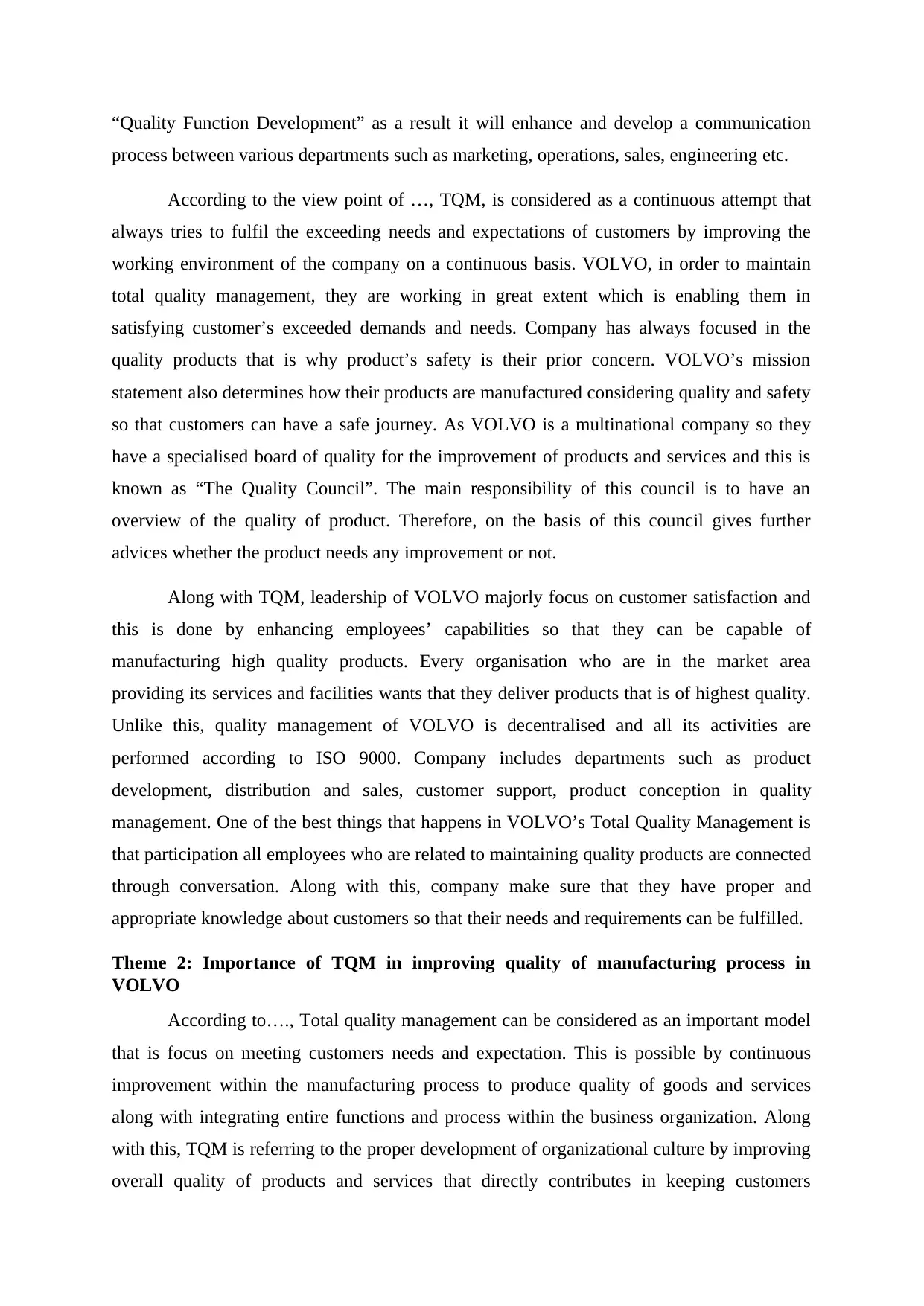
“Quality Function Development” as a result it will enhance and develop a communication
process between various departments such as marketing, operations, sales, engineering etc.
According to the view point of …, TQM, is considered as a continuous attempt that
always tries to fulfil the exceeding needs and expectations of customers by improving the
working environment of the company on a continuous basis. VOLVO, in order to maintain
total quality management, they are working in great extent which is enabling them in
satisfying customer’s exceeded demands and needs. Company has always focused in the
quality products that is why product’s safety is their prior concern. VOLVO’s mission
statement also determines how their products are manufactured considering quality and safety
so that customers can have a safe journey. As VOLVO is a multinational company so they
have a specialised board of quality for the improvement of products and services and this is
known as “The Quality Council”. The main responsibility of this council is to have an
overview of the quality of product. Therefore, on the basis of this council gives further
advices whether the product needs any improvement or not.
Along with TQM, leadership of VOLVO majorly focus on customer satisfaction and
this is done by enhancing employees’ capabilities so that they can be capable of
manufacturing high quality products. Every organisation who are in the market area
providing its services and facilities wants that they deliver products that is of highest quality.
Unlike this, quality management of VOLVO is decentralised and all its activities are
performed according to ISO 9000. Company includes departments such as product
development, distribution and sales, customer support, product conception in quality
management. One of the best things that happens in VOLVO’s Total Quality Management is
that participation all employees who are related to maintaining quality products are connected
through conversation. Along with this, company make sure that they have proper and
appropriate knowledge about customers so that their needs and requirements can be fulfilled.
Theme 2: Importance of TQM in improving quality of manufacturing process in
VOLVO
According to…., Total quality management can be considered as an important model
that is focus on meeting customers needs and expectation. This is possible by continuous
improvement within the manufacturing process to produce quality of goods and services
along with integrating entire functions and process within the business organization. Along
with this, TQM is referring to the proper development of organizational culture by improving
overall quality of products and services that directly contributes in keeping customers
process between various departments such as marketing, operations, sales, engineering etc.
According to the view point of …, TQM, is considered as a continuous attempt that
always tries to fulfil the exceeding needs and expectations of customers by improving the
working environment of the company on a continuous basis. VOLVO, in order to maintain
total quality management, they are working in great extent which is enabling them in
satisfying customer’s exceeded demands and needs. Company has always focused in the
quality products that is why product’s safety is their prior concern. VOLVO’s mission
statement also determines how their products are manufactured considering quality and safety
so that customers can have a safe journey. As VOLVO is a multinational company so they
have a specialised board of quality for the improvement of products and services and this is
known as “The Quality Council”. The main responsibility of this council is to have an
overview of the quality of product. Therefore, on the basis of this council gives further
advices whether the product needs any improvement or not.
Along with TQM, leadership of VOLVO majorly focus on customer satisfaction and
this is done by enhancing employees’ capabilities so that they can be capable of
manufacturing high quality products. Every organisation who are in the market area
providing its services and facilities wants that they deliver products that is of highest quality.
Unlike this, quality management of VOLVO is decentralised and all its activities are
performed according to ISO 9000. Company includes departments such as product
development, distribution and sales, customer support, product conception in quality
management. One of the best things that happens in VOLVO’s Total Quality Management is
that participation all employees who are related to maintaining quality products are connected
through conversation. Along with this, company make sure that they have proper and
appropriate knowledge about customers so that their needs and requirements can be fulfilled.
Theme 2: Importance of TQM in improving quality of manufacturing process in
VOLVO
According to…., Total quality management can be considered as an important model
that is focus on meeting customers needs and expectation. This is possible by continuous
improvement within the manufacturing process to produce quality of goods and services
along with integrating entire functions and process within the business organization. Along
with this, TQM is referring to the proper development of organizational culture by improving
overall quality of products and services that directly contributes in keeping customers
Paraphrase This Document
Need a fresh take? Get an instant paraphrase of this document with our AI Paraphraser
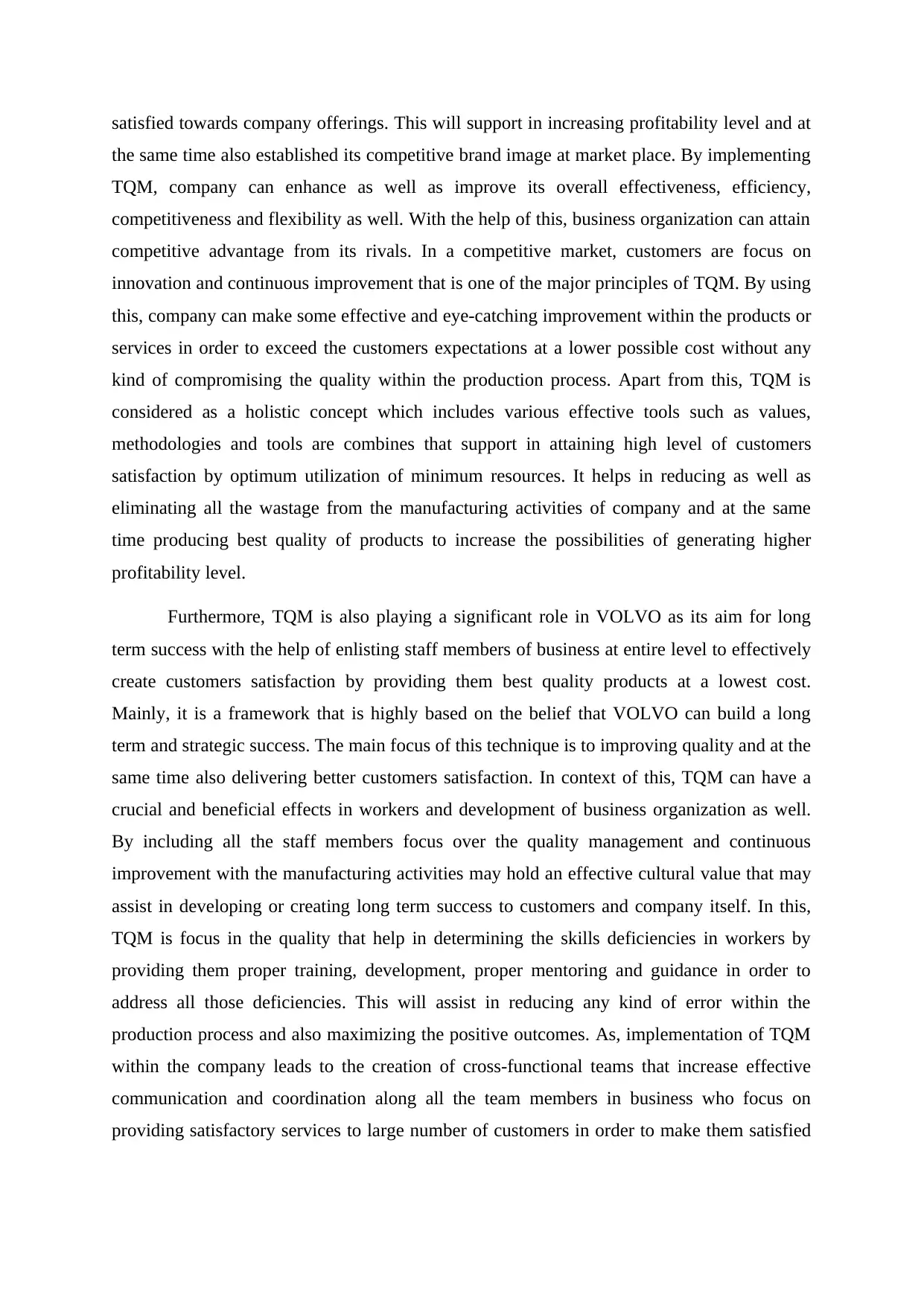
satisfied towards company offerings. This will support in increasing profitability level and at
the same time also established its competitive brand image at market place. By implementing
TQM, company can enhance as well as improve its overall effectiveness, efficiency,
competitiveness and flexibility as well. With the help of this, business organization can attain
competitive advantage from its rivals. In a competitive market, customers are focus on
innovation and continuous improvement that is one of the major principles of TQM. By using
this, company can make some effective and eye-catching improvement within the products or
services in order to exceed the customers expectations at a lower possible cost without any
kind of compromising the quality within the production process. Apart from this, TQM is
considered as a holistic concept which includes various effective tools such as values,
methodologies and tools are combines that support in attaining high level of customers
satisfaction by optimum utilization of minimum resources. It helps in reducing as well as
eliminating all the wastage from the manufacturing activities of company and at the same
time producing best quality of products to increase the possibilities of generating higher
profitability level.
Furthermore, TQM is also playing a significant role in VOLVO as its aim for long
term success with the help of enlisting staff members of business at entire level to effectively
create customers satisfaction by providing them best quality products at a lowest cost.
Mainly, it is a framework that is highly based on the belief that VOLVO can build a long
term and strategic success. The main focus of this technique is to improving quality and at the
same time also delivering better customers satisfaction. In context of this, TQM can have a
crucial and beneficial effects in workers and development of business organization as well.
By including all the staff members focus over the quality management and continuous
improvement with the manufacturing activities may hold an effective cultural value that may
assist in developing or creating long term success to customers and company itself. In this,
TQM is focus in the quality that help in determining the skills deficiencies in workers by
providing them proper training, development, proper mentoring and guidance in order to
address all those deficiencies. This will assist in reducing any kind of error within the
production process and also maximizing the positive outcomes. As, implementation of TQM
within the company leads to the creation of cross-functional teams that increase effective
communication and coordination along all the team members in business who focus on
providing satisfactory services to large number of customers in order to make them satisfied
the same time also established its competitive brand image at market place. By implementing
TQM, company can enhance as well as improve its overall effectiveness, efficiency,
competitiveness and flexibility as well. With the help of this, business organization can attain
competitive advantage from its rivals. In a competitive market, customers are focus on
innovation and continuous improvement that is one of the major principles of TQM. By using
this, company can make some effective and eye-catching improvement within the products or
services in order to exceed the customers expectations at a lower possible cost without any
kind of compromising the quality within the production process. Apart from this, TQM is
considered as a holistic concept which includes various effective tools such as values,
methodologies and tools are combines that support in attaining high level of customers
satisfaction by optimum utilization of minimum resources. It helps in reducing as well as
eliminating all the wastage from the manufacturing activities of company and at the same
time producing best quality of products to increase the possibilities of generating higher
profitability level.
Furthermore, TQM is also playing a significant role in VOLVO as its aim for long
term success with the help of enlisting staff members of business at entire level to effectively
create customers satisfaction by providing them best quality products at a lowest cost.
Mainly, it is a framework that is highly based on the belief that VOLVO can build a long
term and strategic success. The main focus of this technique is to improving quality and at the
same time also delivering better customers satisfaction. In context of this, TQM can have a
crucial and beneficial effects in workers and development of business organization as well.
By including all the staff members focus over the quality management and continuous
improvement with the manufacturing activities may hold an effective cultural value that may
assist in developing or creating long term success to customers and company itself. In this,
TQM is focus in the quality that help in determining the skills deficiencies in workers by
providing them proper training, development, proper mentoring and guidance in order to
address all those deficiencies. This will assist in reducing any kind of error within the
production process and also maximizing the positive outcomes. As, implementation of TQM
within the company leads to the creation of cross-functional teams that increase effective
communication and coordination along all the team members in business who focus on
providing satisfactory services to large number of customers in order to make them satisfied
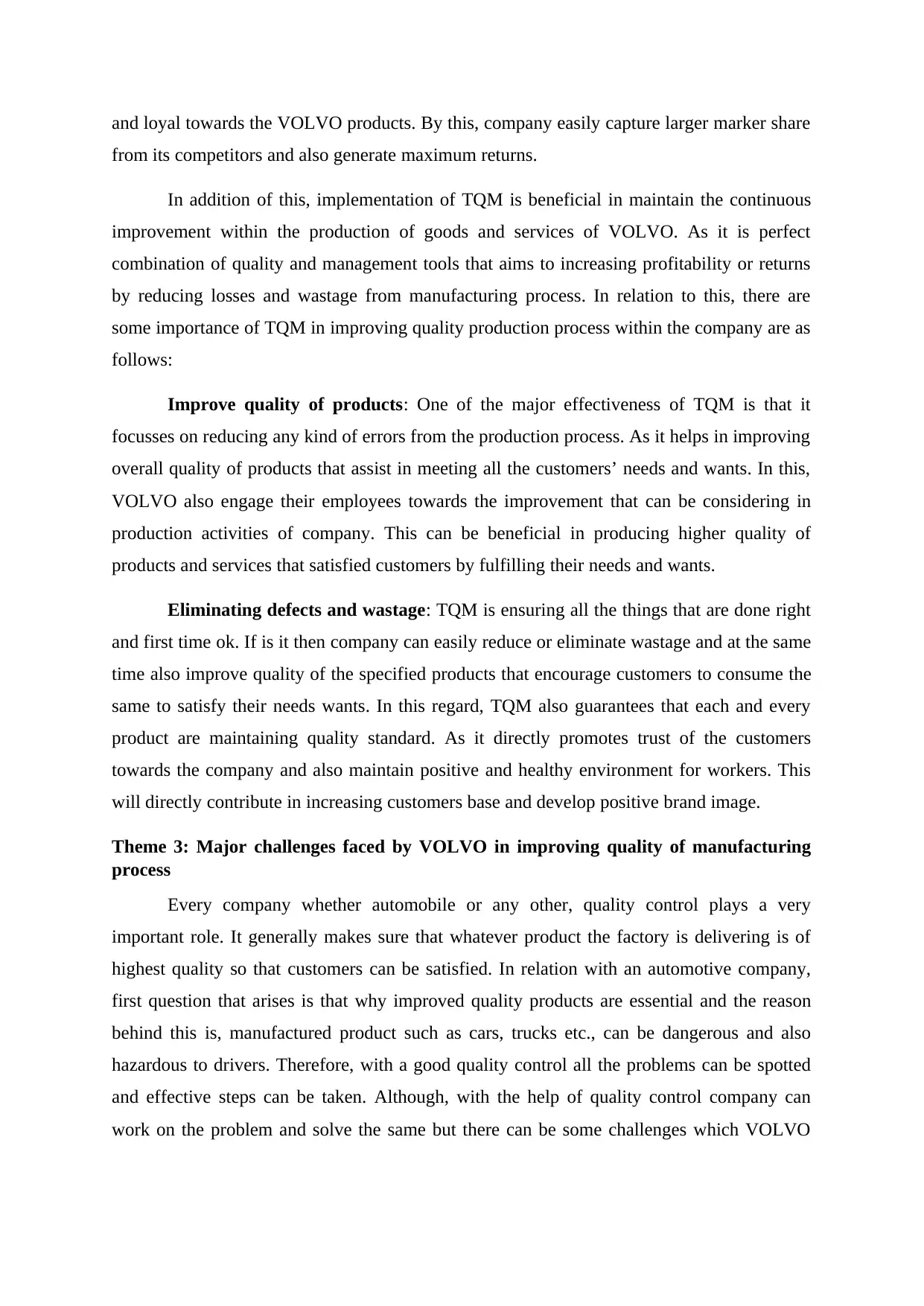
and loyal towards the VOLVO products. By this, company easily capture larger marker share
from its competitors and also generate maximum returns.
In addition of this, implementation of TQM is beneficial in maintain the continuous
improvement within the production of goods and services of VOLVO. As it is perfect
combination of quality and management tools that aims to increasing profitability or returns
by reducing losses and wastage from manufacturing process. In relation to this, there are
some importance of TQM in improving quality production process within the company are as
follows:
Improve quality of products: One of the major effectiveness of TQM is that it
focusses on reducing any kind of errors from the production process. As it helps in improving
overall quality of products that assist in meeting all the customers’ needs and wants. In this,
VOLVO also engage their employees towards the improvement that can be considering in
production activities of company. This can be beneficial in producing higher quality of
products and services that satisfied customers by fulfilling their needs and wants.
Eliminating defects and wastage: TQM is ensuring all the things that are done right
and first time ok. If is it then company can easily reduce or eliminate wastage and at the same
time also improve quality of the specified products that encourage customers to consume the
same to satisfy their needs wants. In this regard, TQM also guarantees that each and every
product are maintaining quality standard. As it directly promotes trust of the customers
towards the company and also maintain positive and healthy environment for workers. This
will directly contribute in increasing customers base and develop positive brand image.
Theme 3: Major challenges faced by VOLVO in improving quality of manufacturing
process
Every company whether automobile or any other, quality control plays a very
important role. It generally makes sure that whatever product the factory is delivering is of
highest quality so that customers can be satisfied. In relation with an automotive company,
first question that arises is that why improved quality products are essential and the reason
behind this is, manufactured product such as cars, trucks etc., can be dangerous and also
hazardous to drivers. Therefore, with a good quality control all the problems can be spotted
and effective steps can be taken. Although, with the help of quality control company can
work on the problem and solve the same but there can be some challenges which VOLVO
from its competitors and also generate maximum returns.
In addition of this, implementation of TQM is beneficial in maintain the continuous
improvement within the production of goods and services of VOLVO. As it is perfect
combination of quality and management tools that aims to increasing profitability or returns
by reducing losses and wastage from manufacturing process. In relation to this, there are
some importance of TQM in improving quality production process within the company are as
follows:
Improve quality of products: One of the major effectiveness of TQM is that it
focusses on reducing any kind of errors from the production process. As it helps in improving
overall quality of products that assist in meeting all the customers’ needs and wants. In this,
VOLVO also engage their employees towards the improvement that can be considering in
production activities of company. This can be beneficial in producing higher quality of
products and services that satisfied customers by fulfilling their needs and wants.
Eliminating defects and wastage: TQM is ensuring all the things that are done right
and first time ok. If is it then company can easily reduce or eliminate wastage and at the same
time also improve quality of the specified products that encourage customers to consume the
same to satisfy their needs wants. In this regard, TQM also guarantees that each and every
product are maintaining quality standard. As it directly promotes trust of the customers
towards the company and also maintain positive and healthy environment for workers. This
will directly contribute in increasing customers base and develop positive brand image.
Theme 3: Major challenges faced by VOLVO in improving quality of manufacturing
process
Every company whether automobile or any other, quality control plays a very
important role. It generally makes sure that whatever product the factory is delivering is of
highest quality so that customers can be satisfied. In relation with an automotive company,
first question that arises is that why improved quality products are essential and the reason
behind this is, manufactured product such as cars, trucks etc., can be dangerous and also
hazardous to drivers. Therefore, with a good quality control all the problems can be spotted
and effective steps can be taken. Although, with the help of quality control company can
work on the problem and solve the same but there can be some challenges which VOLVO
⊘ This is a preview!⊘
Do you want full access?
Subscribe today to unlock all pages.

Trusted by 1+ million students worldwide
1 out of 19
Related Documents
Your All-in-One AI-Powered Toolkit for Academic Success.
+13062052269
info@desklib.com
Available 24*7 on WhatsApp / Email
![[object Object]](/_next/static/media/star-bottom.7253800d.svg)
Unlock your academic potential
Copyright © 2020–2026 A2Z Services. All Rights Reserved. Developed and managed by ZUCOL.





